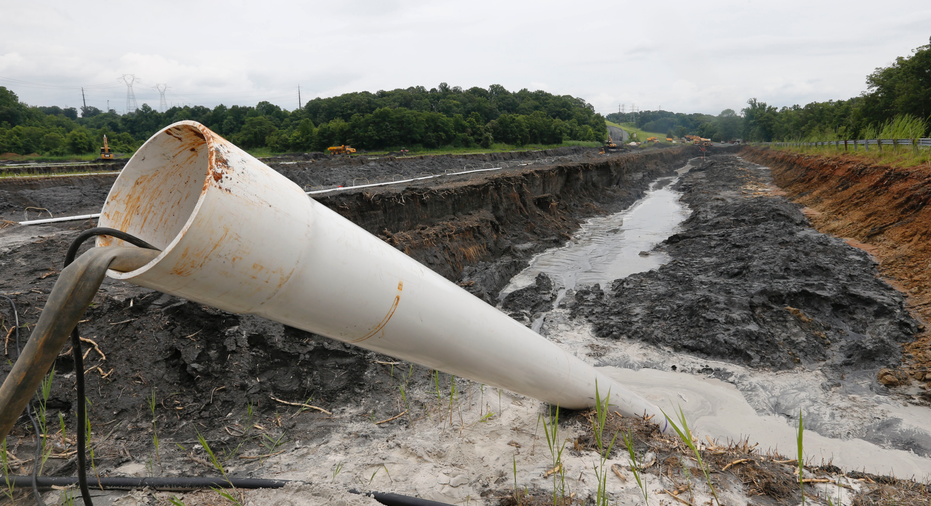Report lays out potential Virginia coal ash options

RICHMOND, Va. – A report prepared for Dominion Energy found it would be far cheaper and quicker to close the company's largest Virginia coal ash ponds by leaving them in place and putting a cover over them rather than recycling the ash or moving it to lined landfills.
The report released Friday was mandated earlier this year by the General Assembly, which also put Dominion's pond closure plans on hold until lawmakers have a chance to review the findings. The report could influence the way forward for Virginia, which, like other states across the nation, is sorting out its long-term plan for dealing with coal ash, the heavy metal-laden waste leftover from decades of burning the fossil fuel to produce electricity.
The report doesn't make explicit recommendations about a preferred solution. But company officials said in an interview that nothing in the findings suggest Dominion should change course from its plans to largely leave the ash in place with a protective covering over top, a solution environmental groups say is insufficient.
"There is nothing that we have learned in the report that says, do something different," Josh Bennett, the company's vice president of technical services, said in an interview with The Associated Press. "What we did learn from the report is that we lay out all the different options very, very clearly for everyone to see."
For decades, coal ash has been stored in landfills or in ponds to keep it from blowing away, often near waterways. A catastrophic 2008 spill in Tennessee drew national attention to the issue. Then, in 2014, a pipe ruptured at a Duke Energy plant, polluting North Carolina's Dan River with miles of gray sludge.
Friday's report covers 11 ash ponds at four power stations that Dominion intends to close to comply with Environmental Protect Agency regulations enacted after the Dan River spill.
At the company's three larger-volume ponds at Bremo, Chesterfield and Possum Point power stations, the report said removal options compared with closure-in-place would generally take longer "and include off-site transportation that would introduce additional safety, environmental, and community impacts."
Removal costs for those ponds would also be an order-of-magnitude larger than closure-in-place, it said.
For instance, at Chesterfield Power Station, the report estimates closing the ponds by removal and recycling would take 21 to 53 years and cost between $1.49 and $4.2 billion. By comparison, closing the ponds in place with a protective cap would take three to five years and cost between $246 million to $1.11 billion, the report said.
At the fourth power station, the Chesapeake Energy Center, Dominion has committed to excavating a relatively small pond that contains about 60,000 cubic yards of ash. A federal judge ruled earlier this year in a lawsuit filed by the Sierra Club that the ash at Chesapeake was polluting surrounding waters with arsenic, but not at levels that threaten health or the environment.
Dominion has around 3 million cubic yards of ash total at Chesapeake but says the rest is not subject to the EPA's coal ash regulations. The report did not evaluate the other ash.
Environmental groups said they were disappointed in the report, which they dismissed as an attempt to validate the plans Dominion has already proposed. They argue the ash should be either recycled or moved to landfills with synthetic liners away from water sources.
The legislature also required the report to cover any water pollution from the ash. Nate Benforado, an attorney with the Southern Environmental Law Center, pointed out that the report found elevated levels of pollutants at all four power stations.
"That's a huge risk, and we don't think that Virginians should be facing the risk for paying that tab. Let's get it done right the first time," Benforado said.
The report said the detections were based on preliminary testing, isolated to areas adjacent to the ash ponds, and do not affect drinking water supplies.
Democratic Sen. Scott Surovell, who introduced the bill and whose district includes the Possum Point power station, said Friday that the assessment will allow lawmakers to have a more informed discussion during the coming session about how best to deal with the ponds.
The report makes cap-in-place look like the cheapest option, but there are probably a lot of human costs that aren't reflected, he said.
"What kind of value do you put in giving a couple hundred people cancer every few years?" said Surovell, who has advocated for more recycling.
Cathy Taylor, senior environmental and sustainability adviser for Dominion, said each pond has a groundwater monitoring network around it and noted that the report also proposes new ways to deal with any potential water issues.
"Ultimately, we have an obligation to do what's right, to make sure that the options that are selected are protective of the environment, can be done safely short term and long term and that we try to minimize the impacts to the community. So that's how we'll move forward," she said.



















